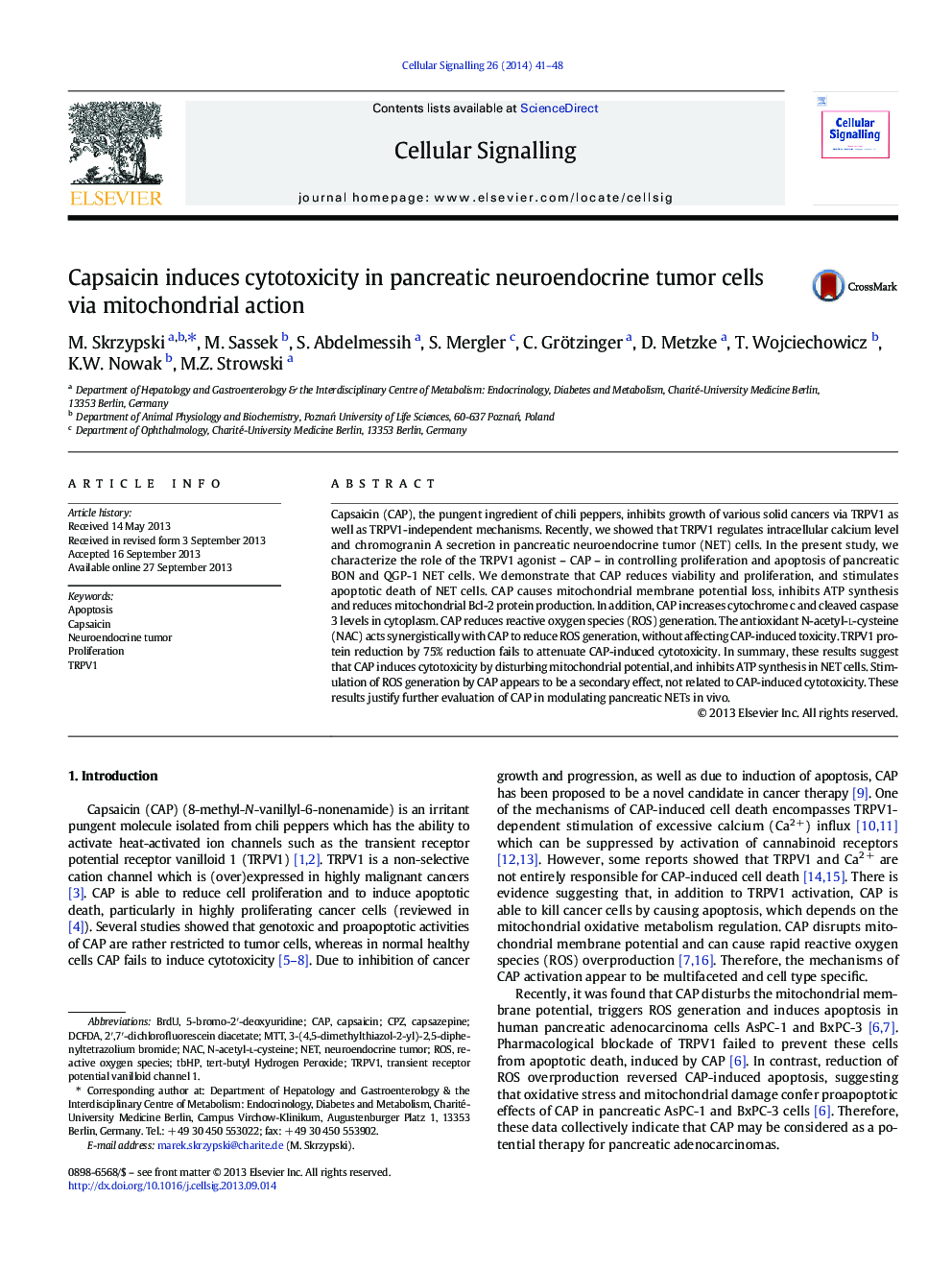| کد مقاله | کد نشریه | سال انتشار | مقاله انگلیسی | نسخه تمام متن |
|---|---|---|---|---|
| 10815366 | 1058469 | 2014 | 8 صفحه PDF | دانلود رایگان |
عنوان انگلیسی مقاله ISI
Capsaicin induces cytotoxicity in pancreatic neuroendocrine tumor cells via mitochondrial action
ترجمه فارسی عنوان
کپسایسین باعث ایجاد سمیت سلولی در سلول های تومور نوروندوکرین پانکراس از طریق فعالیت میتوکندری
دانلود مقاله + سفارش ترجمه
دانلود مقاله ISI انگلیسی
رایگان برای ایرانیان
کلمات کلیدی
tBHPTRPV1DCFDACPZN-acetyl-l-cysteineNAC2′,7′-dichlorofluorescein diacetate - 2 '، 7'-dichlorofluorescein diacetate3-(4,5-dimethylthiazol-2-yl)-2,5-diphenyltetrazolium bromide - 3- (4،5-dimethylthiazol-2-yl) -2،5-difenyltetrazolium bromide5-bromo-2′-deoxyuridine - 5-bromo-2'-deoxyuridineMTT - MTTROS - ROSBrdU - بروموداکسی اوریدینtert-Butyl hydrogen peroxide - ترات بالیت هیدروژن پراکسیدProliferation - ترویجNeuroendocrine tumor - تومور نورو اندوکرینNET - خالصApoptosis - خزان یاختهایCaP - کلاه لبه دارCapsaicin - کپسایسین یا کاپسیسینcapsazepine - کپسپرپینReactive oxygen species - گونههای فعال اکسیژن
موضوعات مرتبط
علوم زیستی و بیوفناوری
بیوشیمی، ژنتیک و زیست شناسی مولکولی
زیست شیمی
چکیده انگلیسی
Capsaicin (CAP), the pungent ingredient of chili peppers, inhibits growth of various solid cancers via TRPV1 as well as TRPV1-independent mechanisms. Recently, we showed that TRPV1 regulates intracellular calcium level and chromogranin A secretion in pancreatic neuroendocrine tumor (NET) cells. In the present study, we characterize the role of the TRPV1 agonist - CAP - in controlling proliferation and apoptosis of pancreatic BON and QGP-1 NET cells. We demonstrate that CAP reduces viability and proliferation, and stimulates apoptotic death of NET cells. CAP causes mitochondrial membrane potential loss, inhibits ATP synthesis and reduces mitochondrial Bcl-2 protein production. In addition, CAP increases cytochrome c and cleaved caspase 3 levels in cytoplasm. CAP reduces reactive oxygen species (ROS) generation. The antioxidant N-acetyl-l-cysteine (NAC) acts synergistically with CAP to reduce ROS generation, without affecting CAP-induced toxicity. TRPV1 protein reduction by 75% reduction fails to attenuate CAP-induced cytotoxicity. In summary, these results suggest that CAP induces cytotoxicity by disturbing mitochondrial potential, and inhibits ATP synthesis in NET cells. Stimulation of ROS generation by CAP appears to be a secondary effect, not related to CAP-induced cytotoxicity. These results justify further evaluation of CAP in modulating pancreatic NETs in vivo.
ناشر
Database: Elsevier - ScienceDirect (ساینس دایرکت)
Journal: Cellular Signalling - Volume 26, Issue 1, January 2014, Pages 41-48
Journal: Cellular Signalling - Volume 26, Issue 1, January 2014, Pages 41-48
نویسندگان
M. Skrzypski, M. Sassek, S. Abdelmessih, S. Mergler, C. Grötzinger, D. Metzke, T. Wojciechowicz, K.W. Nowak, M.Z. Strowski,
